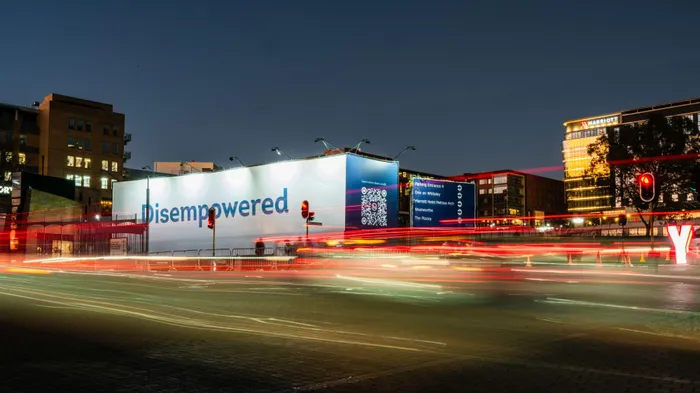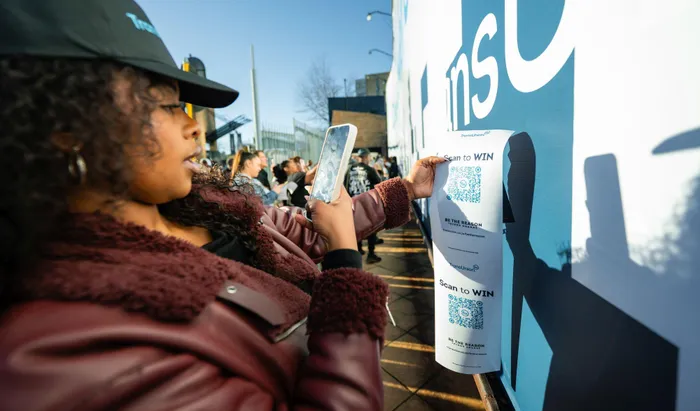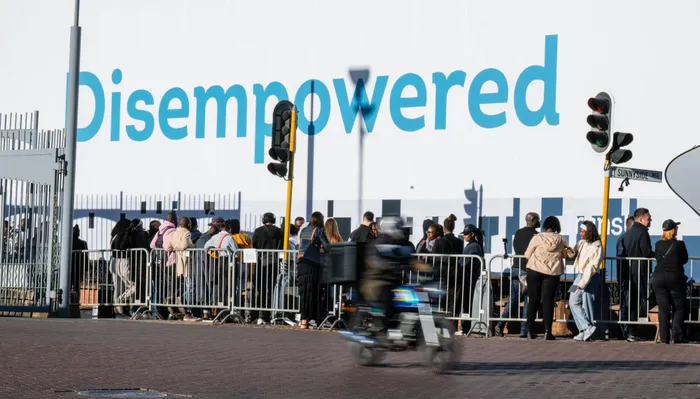Peeling back the layers of credit: TransUnion launches innovative financial literacy campaign

Africa’s first peelable billboard was unveiled at Melrose Arch on August 21, conveying a powerful message.
Image: Supplied
With over 16 million South African adults currently excluded from the formal credit system, and up to half lacking a clear understanding of how credit works, there is a growing call to start peeling the layers off traditional finance models.
That is exactly what TransUnion aims to do with its groundbreaking ‘Be the Reason Things Change’ campaign, which seeks to empower South Africans through financial education.
Fittingly, the campaign saw the unveiling of Africa’s first peelable billboard at the entrance of Melrose Arch in Johannesburg on Thursday. Members of the public were invited to peel off 500 strips, containing a QR code that unlocks a free e-learning education course valued at R2,000. Springbok Lukhanyo Am and fashion entrepreneur Tshepo Mohlala were among the first to peel layers off the new board at the inauguration event.
A further 4,500 courses will be ‘peeled off’ by members of the public online, and TransUnion will also give away five education fund prizes valued at R20,000 each and 10 tech-for-learning prizes, which include a laptop and 12 months' worth of data.

The campaign unlocks valuable e-learning courses for 5,000 people.
Image: Supplied
TransUnion said this movement, which is supported by the International Finance Corporation (IFC), aims to symbolically and physically strip away the barriers that keep millions of South Africans locked out of the formal credit economy.
“This is Africa’s first peelable billboard, and what we’re trying to communicate here is that there are layers of complexity to each person,” TransUnion CEO Lee Naik told IOL.
“It allows us to communicate that you can go from disempowered to empowered. You can go from a person who’s unseen by the banks and the lenders to being seen.
“There are multiple ways that you, as a consumer, can start the journey by empowering yourself, but equally so for banks and lenders - there is more that they can do to see your potential as a consumer.”
But why is this education so important? When people understand their credit profiles, they make better decisions, recover from setbacks, and access life-changing possibilities, TransUnion said.
Many South Africans struggle to access formal credit and quality financial services because traditional systems often feel out of reach, particularly to those who lack past borrowing behaviour. Traditional scoring models often fail to assess these consumers accurately, TransUnion adds, leaving millions outside of the formal credit system.

The peelable billboard attracted enthusiastic crowds.
Image: Supplied
To gain a better understanding of the importance of financial education, IOL caught up with CEO Lee Naik at the launch event on Thursday.
IOL: This is a bold and unexpected move from a credit bureau. Why is TransUnion Africa launching a campaign like this and why now?
Naik: Historically, credit bureaus have been helping banks and lenders make decisions about whether people access finance. Given all the advances in technology, we believe that now is the right time for us to be part of a movement to drive greater inclusion.
Today in South Africa, some 16 million adults are excluded from the financial economy, and we believe that for us to give a better life for all South Africans, we’ve got to start a movement which we call ‘Be the reason’.
IOL: What would you like to teach South Africans about accessing credit?
Naik: Credit is key to accessing opportunity. It’s what we call leverage. By accessing credit, we can do more than we can with our current limited resources. And we’re trying to communicate that credit is a positive thing, if done responsibly.
IOL: Credit bureaus are often misunderstood. Can you help us understand what role TransUnion plays in the lives of everyday South Africans?
Naik: There are six credit bureaus in South Africa, and we’re the oldest, having started in 1901.
One of the roles that we play is to help lenders give you access to a personal loan, a car, or a home loan. To understand who the consumer is more holistically.
Therefore, a cohesive view of all the credit agreements you have and how you’re paying against them is key, and the view here is that credit bureaus typically help banks and lenders understand your current exposure to help determine whether you can get access to more credit and to what level of credit.
Today, the role we want to play as Transunion is to help figure out how we can help banks and lenders see the hopes of consumers and say, "This person has hopes and dreams. We believe this person can be more than the input entered today."
IOL: Why does checking your credit score matter to all South Africans - regardless of income or background?
Naik: A credit score is like a financial passport, and what you’ve really got to understand is that your hopes and dreams can’t just be met with the cash that you have.
However, banks and lenders are prepared to give you access to money, and a key determinant of whether you can get access to money is having a good credit score.
In simple terms, like having a financial passport, it tells us where you’ve been and how you’re doing. And understanding your credit score is like having a baseline and saying: "This is where I am today,, and therefore what do I need to do to become a better version of my financial self?"
IOL: What do you hope to achieve with the 'Be The Reason Things Change' campaign?
Naik: Our view is that more must be done for us to educate our people about financial literacy, which is a massive challenge in South Africa, as it’s something that many people don’t know much about.
Our hope here is that we can do more. Today, we’re extending thousands of e-learning courses for credit for consumers, and the hope is that if we can do more, we can provoke others to be part of this movement.
IOL: Are these courses something the average South African could do easily?
Naik: It absolutely can be done easily. It is six modules, it lasts for two years and we are giving away some 2,000 of these courses over the next week or so. Custom-designed for our ‘Be The Reason’ campaign, it represents millions of rands worth of investment from TransUnion.
IOL: You’ve spoken about empowering consumers - but what about those who don’t even have a credit score yet? How does this campaign help people gain access to credit and start building a financial identity?"
Naik: People believe that credit is scary, largely because there’s no literacy around why it’s important.
Understanding the power of credit and why it’s useful is the first step.
The second step is understanding where you are. You may not realise as a consumer that there actually is data about you. So accessing your credit score for the first time allows you to baseline where you are.
It’s important to note that if you get access to any form of credit, under our National Credit Act, you end up on the credit bureau, meaning that we have a cohesive view of you.
Knowledge is power, so it’s important to understand where you are and start to build a pathway.
We realise that some people have no credit score at all, as they have never had access to credit. So one part is helping them understand that credit is important to accessing financial opportunity.
Equally so, we have found very novel ways of using what we call alternative data, where we use your telco data. Every South African has access to a phone. By using the data on your phone, with your consent, we are able to model a way to say to a bank or a lender, "We think that this person should be given access to credit. You don’t know him historically, but using what we built as an actuarial model, we believe that you should give him a chance."
Alternative data generally means non-financial, non-credit data. What this means is that it could be around how often you charge your phone. Do you often let your phone die completely? There are lots of what we call behavioural patterns that are quite predictive of what we think is important to know about somebody. And it’s quite seamless to you, the consumer. All we need is your permission to access your information, in this case via MTN, and there will be other telcos coming on board in the future.
IOL: What kind of response have you seen so far from the public – and what is your final call to action for South Africans?
Naik: Well, I think it has been an amazing launch, and a really great interest from our consumers and great participation in the actual peelable billboard, and this will continue over the next weeks and months.
For us, this is the start of a movement. My hope and my dream is that people take up the challenge to say: “I can be in charge of me, I can be in control of me”, and to realise that we can change our financial access and opportunity and our success in life generally. Starting and taking control of your financial health.
IOL Business
Related Topics: